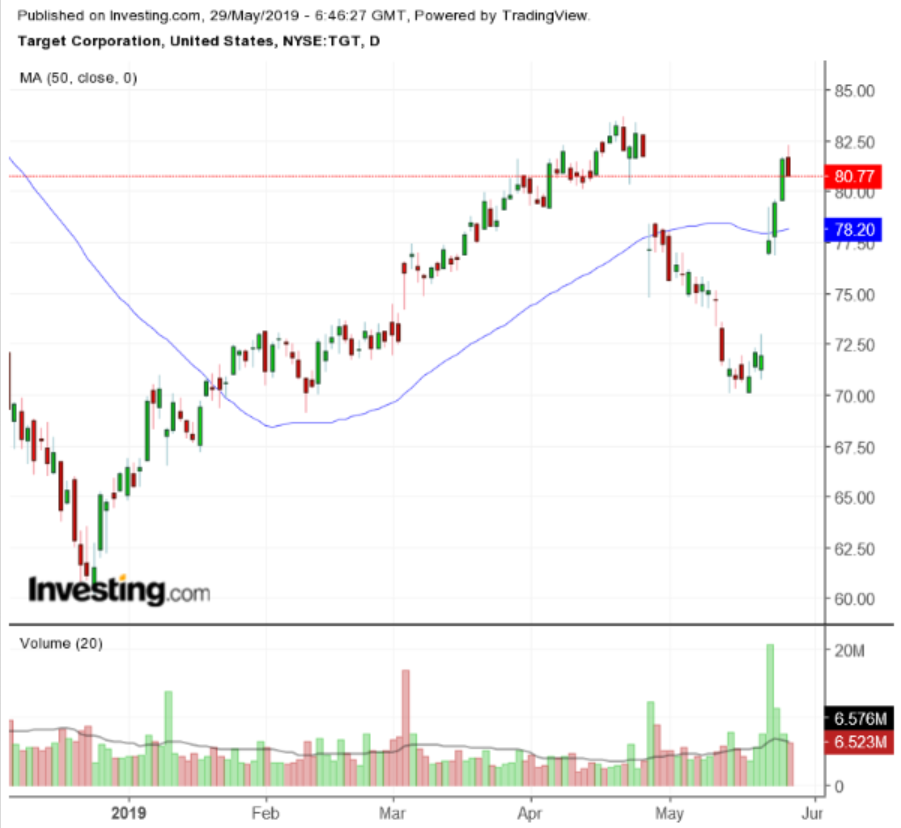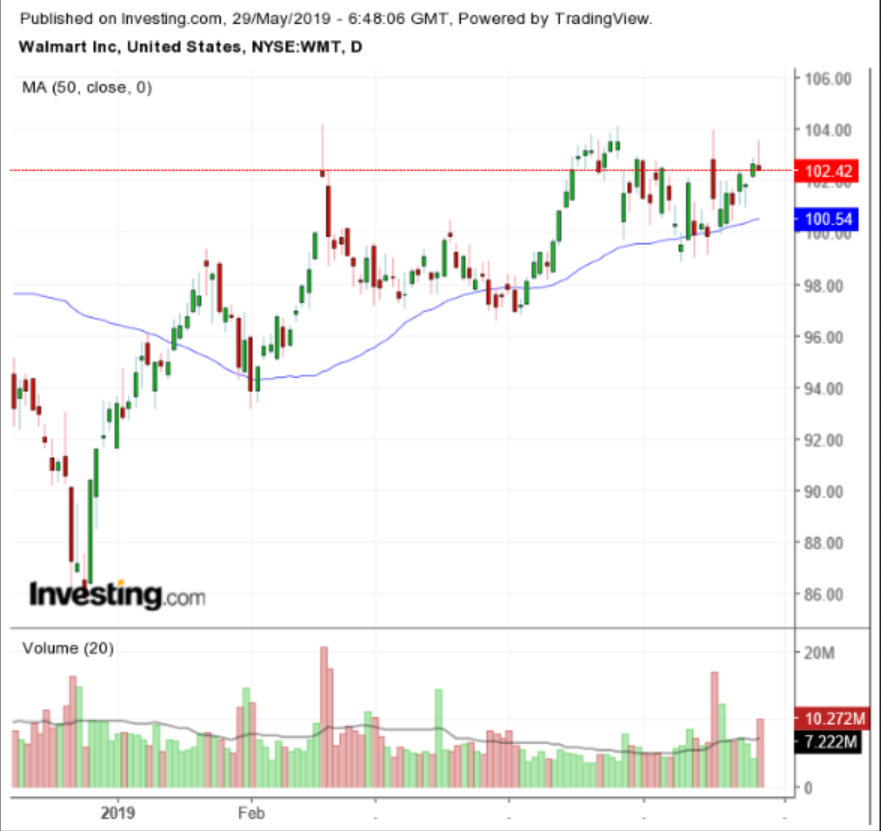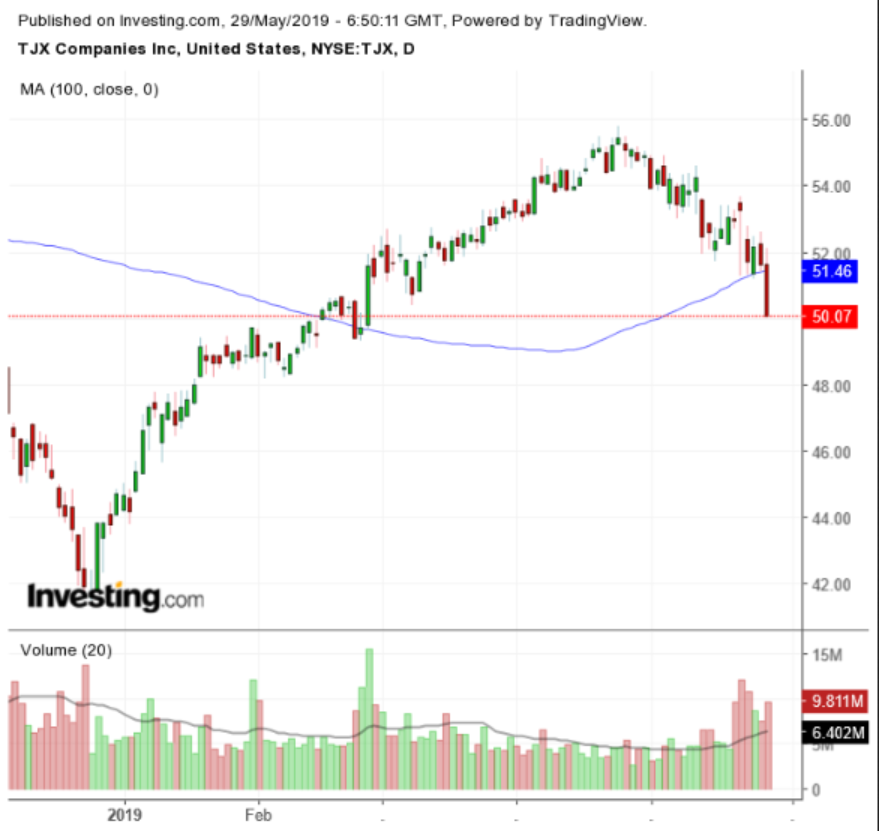The final group of companies to report first quarter earnings this season were major U.S. retailers, and the results were mostly gloomy. Major department stores such as Nordstrom (NYSE:JWN), Kohl's (NYSE:KSS), and J.C. Penney (NYSE:JCP) all reported dismal results, underscoring worries they've failed to keep up with the changing tastes and buying habits of American consumers.
Still, not all retail results were ugly. There were a few winners that have shown they can successfully compete with Amazon (NASDAQ:AMZN) online, while also finding the right mix of products and services to keep shoppers coming into their bricks-and-mortar stores.
Now that all the numbers are in, here's a closer look at three retailers that have managed to defy the sector downtrend:
1. Target: Revamp Paying Off
Target (NYSE:TGT) delivered another impressive quarter when it reported its latest earnings results on May 22. Shares, which closed at $80.77 as of Tuesday, jumped 7.8% after the release, in reaction to the news.

The discount retailer earned $1.53 per share for the first quarter of 2019, while revenue totaled $17.6 billion—both topped expectations.
However, the number that likely wowed investors the most was a 4.8% increase in quarterly same-store sales growth, which beat forecasts for 4.2%. This marked the eighth consecutive quarter that same-store sales expanded, a sure measure that more customers are shopping at Target's stores where they continue to spend more money.
Another promising sign: Target’s e-commerce sales surged 42% from the same quarter a year earlier. Purchases that originate online now represent 7.1% of Target’s total transactions, up from 5.2% a year ago, reassuring investors that the Minneapolis-based retailer's digital-focused sales growth strategy is succeeding.
“Target’s first-quarter performance and market-share gains demonstrate that the model is working,” CEO Brian Cornell said in a statement. He added that Target is “well-positioned to deliver strong financial performance in 2019 and beyond.”
Despite shares already having seen a 22% run-up so far this year, we expect Target to continue to do well amid indications that its recent efforts to revamp its stores, website and supply chain are paying off.
2. Walmart: Eye-Popping E-Commerce Growth
Thanks in large part to robust growth in its e-commerce sales, Walmart (NYSE:WMT) beat earnings estimates when it reported its latest quarterly results on May 16. The world's largest retailer's online sales have been rising at a rapid pace compared with the rest of the industry.

The Arkansas-based retail behemoth saw e-commerce sales grow by 37% in its fiscal first-quarter, boosted by its booming online grocery business as well as stronger sales of fashion accessories and home goods. That was even better than online sales growth of 33% a year earlier.
The eye-popping growth in e-commerce offered further evidence that Walmart’s ongoing efforts to compete with Amazon in the online retail space appear to be paying off.
“We’re continuing our transformation to become more of a digital enterprise,” Walmart CEO Doug McMillon said in a statement.
The company also provided a solid update on U.S. same-store sales growth, which increased 3.4%, the best growth of that metric during the first quarter in nine years. It also marked the fourth consecutive quarter in which Walmart reported same-store sales growth of above 3%.
Walmart looks set to continue its strong performance in upcoming quarters. Its investments in technological innovation and e-commerce have transformed it into one of the best growing mature retailers in the online market.
That being said, one of the biggest looming threats for Walmart for the remainder of the year could be the possibility of additional trade tariffs, something that would impact apparel and footwear specifically. “Increased tariffs will increase prices for customers,” CFO Brett Biggs said.
Shares of Walmart, which closed at $102.42 as of last night, have gained 10% since the start of the year.
3. TJX Companies: Cashing In On Big Market Share Opportunities
Off-price retailer TJX Companies Inc (NYSE:TJX), which owns the T.J. Maxx, Marshalls and Home Goods brands, reported first-quarter earnings that beat expectations on May 21, offering more evidence that its business is weathering the retail storm much better than most of its peers.

The Massachusetts-based retailer reported earnings of $0.57 a share on revenue of $9.28 billion, slightly ahead of the expectations for earnings of $0.55 share on revenue of $9.22 billion. Comparable store sales rose 5%, easily topping expectations for growth of 3.6%, thanks to a ramp-up in foot traffic as it continues to gain market share at the expense of reeling competitors.
"We are in an excellent position to take advantage of the abundant buying opportunities we are seeing in the marketplace for quality, branded merchandise and to keep flowing fresh, exciting assortments to our stores and online," said Chief Executive Ernie Herman in a statement. "We have many initiatives underway to keep driving sales and customer traffic, and feel great about our ability to continue to gain market share around the world."
The company also raised its guidance for the full-year, saying it now expects diluted earnings per share for the year ending Feb. 1, 2020 to be in the range of $2.56 and $2.61, up from the $2.45 a share the year before.
Accordingly, management announced a dividend hike of 18% in the first quarter. This will mark TJX Companies’ 23rd successive year that they've increased their quarterly dividend. It also bought back $350 million in shares during the first three months of the year. The stock currently yields 1.78%.
Taking all this into consideration, TJX remains a compelling name in the retail space given its resilient business model, which has enabled it to weather the retail apocalypse better than its peers.
Shares closed at $50.07 yesterday and are up 12% so far this year.
